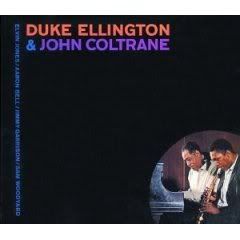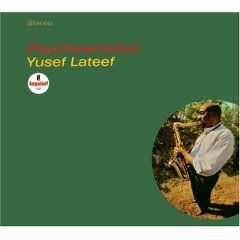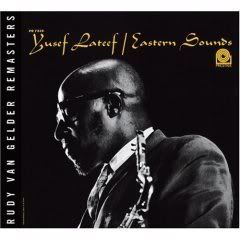| Author | Message |
John Coltrane: Saxophone Icon, Part 2 NPR.org, June 25, 2008 - After years of playing with Dizzy Gillespie, Miles Davis and Thelonious Monk, saxophonist and composer John Coltrane began to emerge as a jazz pioneer at the end of the 1950s. A few months after recording the now-venerated Kind of Blue with Miles Davis, Coltrane made a classic album of his own with Giant Steps.
During the early 1960s, Coltrane formed one of the most memorable quartets in jazz, featuring pianist McCoy Tyner, drummer Elvin Jones and bassist Jimmy Garrison. The group's first major recording was 1960's My Favorite Things (featuring the quartet's original bassist, Steve Davis). The title track, a reinvention of a Rogers and Hammerstein tune from The Sound of Music, marked several significant events for Coltrane: It showcased him on soprano saxophone for the first time on record, and was one of the first recordings on which he plainly explored an "open" modality. Coltrane performed the tune frequently throughout his career, modifying his approach to it as his own music changed. While Coltrane's career was on the upswing, his marriage was deteriorating. According to historian Lewis Porter, one of the main problems Coltrane had with his first wife, Naima, was that she wasn't a musician and couldn't understand his obsessions. Coltrane would later marry an accomplished musician — pianist and harpist Alice McLeod (later Coltrane). Alice often traveled with the quartet, and in the mid-'60s she replaced Tyner in the group. Though steeped in the feel of swing and the blues, Coltrane's music quickly absorbed influences from around the globe, including Spain and West Africa. Spiritually, he was drawn to the teachings of Hinduism and the music of sitar master Ravi Shankar, and Coltrane also incorporated South Asian textures into his work. Coltrane's lengthy, boundary-stretching solos were becoming legendary, but they initially turned off many jazz critics. For example, a 1961 performance review in Down Beat magazine described his music as "anti-jazz." Ironically, early in this period of comparatively esoteric exploration, Coltrane's recorded output featured several albums with mainstream appeal — one with Duke Ellington, another with vocalist Johnny Hartman. As a result, some criticized Coltrane as being anti-jazz while others remarked that he was pandering to the recording industry. But Coltrane defended his albums with Ellington and Hartman as strenuously as he did the long, exploratory solos he took on stage. Among many recordings of the "classic" quartet, Coltrane's most heralded album remains A Love Supreme, made in late 1964. Synthesizing the post-bop of his earlier career and the freer improvisations he was fast developing, A Love Supreme documents a suite of compositions inspired by religious conviction. The album also started a major thematic trend, with Coltrane's spiritual consciousness informing much of his later output. Drawing more and more heavily from "out" improvisers, Coltrane's music grew in abstraction and harmonically unrestrained intensity. Saxophonists such as Ornette Coleman and Albert Ayler influenced Coltrane's more abstract works, including 1965's Ascension and Om. Younger avant-garde musicians including saxophonists Pharaoh Sanders and Marion Brown and drummer Rashied Ali also complemented the classic quartet during its later years. For all of Coltrane's spiritual awareness, however, the increasingly abstract music caused some discord with original quartet members McCoy Tyner and Elvin Jones, and both musicians eventually left the group. Coltrane later explained that his music was simply going in two separate directions at once. Alice Coltrane and Rashied Ali replaced Tyner and Jones, respectively. Early in 1967, John Coltrane was diagnosed with liver cancer. He continued to perform, but his music was so physically demanding that he had difficulty maintaining his touring schedule. By the time Coltrane's cancer was diagnosed, it was already inoperable. Coltrane died in New York City on July 17, 1967, two months shy of his 41st birthday and two months after playing his last concert in Baltimore, Md. Although his explorations of the abstract, spiritual side of jazz had barely begun at the time of his death, Coltrane's legacy informed every jazz saxophonist who followed him, and is a continuing influence on jazz today. © Copyright 2008 NPR Follow this link to hear the audio: http://www.npr.org/templa...d=91859910 "Love and compassion are necessities, not luxuries. Without them humanity cannot survive."
Dalai Lama | |
- E-mail - orgNote -  Report post to moderator Report post to moderator |
Great read...
I'd rather listen to the music, though... ~runs to put Coltrane on~ | |
- E-mail - orgNote -  Report post to moderator Report post to moderator |
cubic61052 said: Coltrane's lengthy, boundary-stretching solos were becoming legendary, but they initially turned off many jazz critics. For example, a 1961 performance review in Down Beat magazine described his music as "anti-jazz." Ironically, early in this period of comparatively esoteric exploration, Coltrane's recorded output featured several albums with mainstream appeal — one with Duke Ellington, another with vocalist Johnny Hartman. As a result, some criticized Coltrane as being anti-jazz while others remarked that he was pandering to the recording industry. But Coltrane defended his albums with Ellington and Hartman as strenuously as he did the long, exploratory solos he took on stage.
The mark of a truly versatile musician. Thanks for posting that... 
... tA  Tribal Disorder Tribal Disorder
http://www.soundclick.com...dID=182431 "Ya see, we're not interested in what you know...but what you are willing to learn. C'mon y'all." | |
- E-mail - orgNote -  Report post to moderator Report post to moderator |
Did you catch Part 1 last week?
"Love and compassion are necessities, not luxuries. Without them humanity cannot survive."
Dalai Lama | |
- E-mail - orgNote -  Report post to moderator Report post to moderator |
cubic61052 said: Did you catch Part 1 last week?
I was in Vegas but I got it. tA  Tribal Disorder Tribal Disorder
http://www.soundclick.com...dID=182431 "Ya see, we're not interested in what you know...but what you are willing to learn. C'mon y'all." | |
- E-mail - orgNote -  Report post to moderator Report post to moderator |
theAudience said: cubic61052 said: Coltrane's lengthy, boundary-stretching solos were becoming legendary, but they initially turned off many jazz critics. For example, a 1961 performance review in Down Beat magazine described his music as "anti-jazz." Ironically, early in this period of comparatively esoteric exploration, Coltrane's recorded output featured several albums with mainstream appeal — one with Duke Ellington, another with vocalist Johnny Hartman. As a result, some criticized Coltrane as being anti-jazz while others remarked that he was pandering to the recording industry. But Coltrane defended his albums with Ellington and Hartman as strenuously as he did the long, exploratory solos he took on stage.
The mark of a truly versatile musician. Thanks for posting that... 
... tA  Tribal Disorder Tribal Disorder
http://www.soundclick.com...dID=182431 Having explored 'Trane's work as a leader to a fair degree, I have decided that I respect the man, the musician, but I don't especially like or enjoy his work. It's interesting how he was one of those artists exploring styles beyond America and trying to incorporate these into jazz (though by no means the first. Yousef Lateef deserves more credit than he gets for helping introduce this sort of thing into jazz - especially an 'Eastern' feel into the music. And then there was Don Cherry of course.) and his dedication to self development improvement seems to have been sincere and a truly worthy goal. But - Personally, I just find Coltrane far too serious (earnest would be a better word) and constantly intense a player, who imo replaced his previous substance addictions with an addiction/ obsession with improving his art and exploring world religions and mysticisms. He seems to have pursued all these things with the fanatical zeal of the converted, which, to my mind, smacks of a desperate search for an inner peace he seems never to have found. And yet, for all his 'searching' in the '60s, his music remained very turbulent and imo tormeted sounding, revolving obsessively around endless variations of things like 'My Favourate Things' and the amazing dedication with which he pursued the study of new scales, modes and chords, striving almost religiously for new ways of doing things. He seemed to have misplaced a sense of humour along the way tho ... Which is part of what puts me off his music. In the '60s, his horn often sounds like the stern, hellfire warnings of a Baptist preacher, with little variation (and more importantly breathing space) in his playing, and other than picking up the soprano sax (a fairly neglected instrument in jazz after Sidney Bechet, IIRC), with a few exceptions like 'Ascension' and some tragically unrecorded gigs he did with Wes Montgomery in San Francisco IIRC, a lack of 'colour' and variation in his instrumentation and that of his supporting musicians. I think Coltrane was approaching things from the wrong angle, and should have listened to Miles more. 'Trane was constantly striving to change/ improve his own playing, while Miles' playing remained relatively unchanged (though he did play more fiercely and used more notes in the aftermath of 'Trane's departure, as IIRC he felt George Coleman was too 'laid back' after the 'fire and ice' duo'Trane and Miles had going.). But the thing was, that Miles' backgrounds were always changing, while he stayed constant. 'Trane seemed to be appraoching things from the other way, by constantly experimenting with his own sound and letting the rest of the band pick up the pieces when his mouthpiece needed cleaning out. The man just played too much damned horn for my liking IMO - He should have drastically cut down/ honed his solos and let his bands play more and give greater dynamics and variation to the music, instead of nailing the listener to the wall with a kind of relentless 'heavy metal jazz' assault. As with many artists obsessed with the 'art' of their instrument, they study music at the expense of the very thing that feeds all art - life, in all its flavours, the ups and downs and emotions of the human heart. Music imo should be a dialogue, not a monologue. Having said that, I appreciate the fact he had great musicians like Elvin Jones and the always under-rated Eric Dolphy in his bands at that time, and 'Trane's earlier work under Miles and Monk is almost beyond reproach. And I actually find the idea of his correspodence with Ravi Shankar rather touching, as Shankar says Coltrane regarded him as one of the 'masters' of music, and 'Trane had been keen to study directly under Shankar, in a similar way that IIRC correctly Charlie Parker once longed to become a pupil of 'modern classical' composers such as Varese and Hindemuth. And, while not really his fault, one last thing we have 'Trane to 'thank' for - all of the 'Trane acolytes, who have even more earnestly striven to continue what the man started all those years ago. As with most imitators/ influencees, with a few exceptions like imo Steve Coleman, they added little and ultimately diluted what Coltrane was about. A similar fate would await the imo even more 'out there' sounds of Jimi Hendrix. Music can lose its original 'meaning' with constant repetition and imitation, especially the further it gets from the historical context it was originally created in. And in Coltrane's case, yes, the turbulent '60s America 'Trane lived in must have partly informed his tormented sound, as with his interesting piece, 'Alabama', where he does a Hendrix 'Machine Gun (before Jimi) in depicting the sounds of racial and contemporary strife in his turbulent, at times frightening playing. But not all life and music needs to be like 'Alabama'. It's quite sad that even today, over 40 years after his passing, many new sax players get noticed by doing a Coltrane imitation (tho the same is true of new trumpeters with Miles), thus proving that the jazz tradition(s) which the man was a part of have now become officially 'classical' music. So, like all great artists, his music and history are complex, at times controversial and invoke feelings of ambivalence in the listener (especially myself, as I read this post through again I'm still quite interested to hear the record of 'Trane's studio encounter with the urbane, sophisticated Duke Ellington tho. Duke was a man of the world if ever there was one, and the idea of him encountering the 'jazz monk' that was '60s John Coltrane is quite intriuging. [Edited 6/26/08 14:23pm] | |
- E-mail - orgNote -  Report post to moderator Report post to moderator |
Miles said: [A great deal of good stuff]
I'll have to respond to some of the things you've laid out there when I have a little more time. But I just wanted to compliment you for taking the time to write such a detailed and thoughtful post. tA  Tribal Disorder Tribal Disorder
http://www.soundclick.com...dID=182431 "Ya see, we're not interested in what you know...but what you are willing to learn. C'mon y'all." | |
- E-mail - orgNote -  Report post to moderator Report post to moderator |
Do you mean this one?

I have never heard it either, but thanks for the heads up....I'll have to check it out. Also, thanks for giving a shout out to Yusef Lateef....a huge talent, deserving of much more recognition than he is given. Check out... 

Like tA, I do not have the time today to participate, but I will try to organize my thoughts and write back some time over the weekend. "Love and compassion are necessities, not luxuries. Without them humanity cannot survive."
Dalai Lama | |
- E-mail - orgNote -  Report post to moderator Report post to moderator |
theAudience said: Miles said: [A great deal of good stuff]
I'll have to respond to some of the things you've laid out there when I have a little more time. But I just wanted to compliment you for taking the time to write such a detailed and thoughtful post. tA  Tribal Disorder Tribal Disorder
http://www.soundclick.com...dID=182431 Thank you, tA. There's been imo so little meat to chew on round here recently, that the chance to discuss a musical titan like Coltrane was too great a chance to let up. Yes, I have put in a fair bit of thought on my position on 'Trane on and off in recent years. He is obviously a hugely important figure in jazz history, and he has been a source of inspiration to so many jazz and other musicians the world over, from Jan Garbarek to Santana, but it took time and study for me to put my finger on what it was that made me dig his 'mature' work far less than, say Miles'. In my piece, I neglected to mention the major influence on 'Trane of Sun Ra's tenor sax god John Gilmore, from whom Coltrane borrowed many of his sax atonal 'honks' and 'harmonics' in his '60s playing. I will 'stay tuned' for your response and that of Cubic61052 in due course [Edited 6/27/08 12:42pm] | |
- E-mail - orgNote -  Report post to moderator Report post to moderator |
cubic61052 said: Do you mean this one?
That's the one, yes. I also dig 'Money Jungle' the 'triple terror' of Duke, Mingus and Max Roach. Some great stuff on that one, with Charles seeming to be royally trying to kick the Duke up the *** with his turbulent bass playing. : 
I have never heard it either, but thanks for the heads up....I'll have to check it out. Also, thanks for giving a shout out to Yusef Lateef....a huge talent, deserving of much more recognition than he is given. Check out... 

Like tA, I do not have the time today to participate, but I will try to organize my thoughts and write back some time over the weekend. It is also good to note that Mr Lateef is one of the very few classic jazz greats who still walks amongst us, even though he's pushing 90! I look forward to reading your thoughts. | |
- E-mail - orgNote -  Report post to moderator Report post to moderator |
Awesome....actually I was first turned on to Yusef in the early 80's in NYC by a friend, coincidentially enough, also named Youssef.....different spelling, but same name!
I'll check out the Coltrane/Ellington/Roach collaboration.... Thanks! "Love and compassion are necessities, not luxuries. Without them humanity cannot survive."
Dalai Lama | |
- E-mail - orgNote -  Report post to moderator Report post to moderator |
 New topic
New topic Printable
Printable